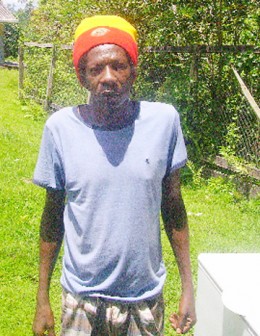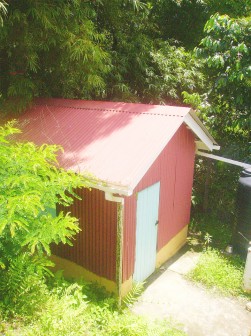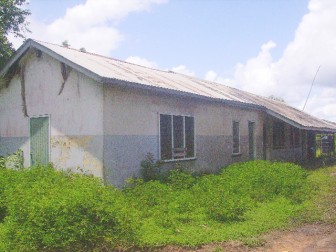Up to last week, the deteriorating Pakera Hospital in Matthew’s Ridge, in Region One, had been without food for a month.
Regional Chairman Paul Pierre told Stabroek News that there was no food shortage, but this newspaper had recently visited the facility, where both staff members, patients and the bare kitchen confirmed the situation. As a result, staff members either pooled their money to buy food to feed the patients or the patients had to find their own meals.

“This here is not a hospital for people,” an upset Garfield Scipio told Stabroek News at the facility. His wife had been a patient of the hospital, after she began experiencing symptoms of malaria.
In addition to no food for patients, they found a hospital where they were forced to endure mosquitoes, poor lighting, and leaky roofs. The fact that the hospital had not received any food supplies from the region simply added to their woes.
Pierre said that food was prepared through funding from the regional administration at Mabaruma. The hospital’s administration, he explained, would make requests to the administration and food would be supplied via an arranged system. But when this newspaper visited, the soup on the stovetop at the hospital had been prepared using supplies that Scipio, a baker, had brought himself.
Scipio said that he had rushed his wife to the facility the night before from Eye Lash Backdam, after she began experiencing malaria symptoms. It took them more than three hours to reach the hospital on an All Terrain Vehicle (ATV) because of the poor state of the road.
Scipio noted that he had to supply the hospital with the provision to make soup for his wife after being told that there was no food.
“There are poor standards here. There are no proper pillows and netting for the patients. No sheets,” he said angrily, while adding that there is urgent need for a medical centre in Eye Lash Backdam, which is one of the gold mining areas from which the government receives a lot of revenues.

Scipio, who is originally from Georgetown, said health is very important in the North West and that properly-equipped hospitals are crucial, especially since malaria is widespread in the region. He felt the Pakera Hospital needed a “complete upgrade.”
“I don’t understand how people could be so heartless to be treating people like this and to neglecting this place like this,” he added, while noting that his wife could not be moved from the facility because she was in a bad state.
He explained that shortly before Stabroek News arrived, she had stopped breathing. “Every day I will have to contribute food,” he noted.
Apart from Scipio’s wife, there was one other patient admitted to the hospital when this newspaper visited and he was sitting in the weeds near the malaria department waiting for the results of his malaria smear.
Several parts of the hospital’s roof appeared to be rotten, while some buildings were surrounded by knee-high bushes or covered in vines. Stabroek News was told that there are no lights in the delivery room. In the event that the room has to be used, a portable light is brought in so that the midwife and other nursing staff can see.
Several residents this newspaper spoke with said that it is unfortunate that the hospital’s staff is being made to operate under less than acceptable standards and they called for the situation to be urgently rectified by those in authority. Miners from the various mining areas within range would travel to Matthew’s Ridge for medical attention, rather than go to Port Kaituma which is farther away.
Regarding the conditions at the hospital, Pierre admitted that there is need for improvements at the facility. He noted that while he believed that there were provisions in this year’s budget for improvement works, he needed to verify the information with the Regional Health Officer.

Meanwhile, what is called the hospital’s morgue, meanwhile, is a zinc structure which has no refrigeration system and is so small it can only accommodate one body at a time. Corpses are stored in a large wooden box which is lined with what appears to be zinc. There is no electricity supply to the facility, although the hospital is powered by a generating system which was donated by Reunion Manganese Inc., a Canadian mining company with an operation in the area. As a result, residents have to buy ice, which is not produce on a large-scale basis like in Port Kaituma. It is for this reason that most relatives bury the dead within 24 hours.
Regional Executive Officer Nigel Fisher had told this newspaper in June that there was a proposal to extend a building there to allow for the installation of a freezer sometime later this year.




